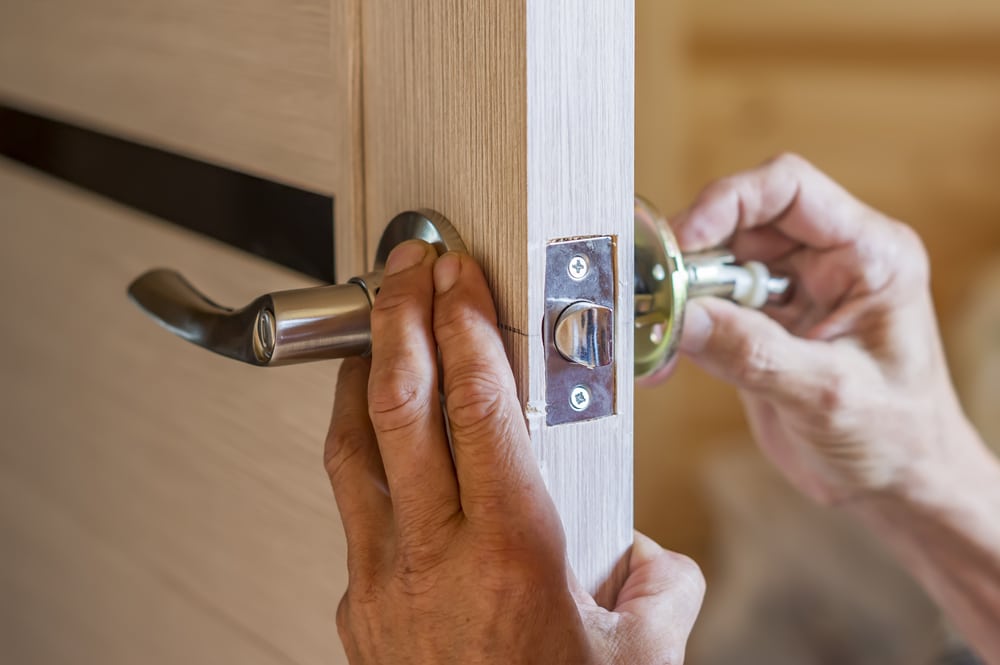Ending a marriage raises many complex legal questions about a shared home.
One common question is: Can locks legally be changed during a divorce?
This blog covers some key legal and practical considerations for UK homeowners.
If you own the house on your own…
When a property is entirely in one partner’s name, the legal situation around changing locks is often more straightforward.
However, joint beneficial ownership and rights to occupy through prior cohabitation can still factor in ethically and legally.
After seeking legal advice, you confirm that you are the sole legal and beneficial owner, and your former partner has no rights to occupy.
In that case, you may be entitled to change entrance locks. However, there is still a formal process that you should legally follow.
Procedures for legally changing locks
Notification
You should formally notify your former partner that you plan to change the locks.
They should be given reasonable notice to collect essential personal belongings while supervised.
Typically, police presence would be involved if there are domestic violence issues.
Decide which locks
You need to be very careful to only change relevant locks.
You cannot, for example, legally deny access to jointly owned possessions inside the home. This includes items you plan to split during separation proceedings.
However, you can change locks for areas where you are the sole legal owner.
For example, outbuildings, garages or sheds on the property.
Keep records
Keeping copies of correspondence and notifications around changing locks and restricting future access is advisable. This protects you legally if disputes arise later.
Possessions collections
Suppose your former partner owns possessions left at the home. In that case, you must continue to grant them supervised access to retrieve belongings at mutually agreed times.
Be aware of ownership rights
Even as sole legal owner, if your ex-partner has resided in the home with you for an extended period, they may have accrued certain “beneficial ownership” rights.
These ethical occupancy rights mean formally denying access and changing locks without mediation or court order, which could still lead to civil lawsuits.
If you have children together, restricting access to the family home without custody agreements could violate parental rights.
Tread carefully and consult a lawyer before changing locks when ethical occupancy concerns exist. Mediated temporary shared access may be advised.
If you jointly own the house together…
Joint home ownership among unmarried or married partners makes deciding unilateral lock changes all the more complex.
The legal situation can be further complicated if you co-own the home with your former partner and jointly occupy the property.
If a home is jointly purchased or owned in both names, regardless of who moved out, neither party can legally lock the other owner out of the property.
This includes rental and mortgaged properties where both partners are named on the title deeds. All co-owners maintain equal rights to access, occupy and use a jointly owned home.
Can I change the locks during a divorce?
Family court judges rarely authorise a sole co-owning spouse or ex-partner to change shared home locks.
This applies even during pending divorce and separation proceedings.
Changing locks without a prior court order could lead to civil lawsuits or even criminal charges in some cases.
Suppose there are issues between co-owning partners around home access restrictions.
In that case, options like mediation can lead to temporary agreements. Or, as a last resort, applying for court orders around supervision, scheduled access or the eventual sale of the property.
Changing locks of jointly owned homes should never be done without:
- Formal written temporary agreements between partners around access schedules and retrieval of possessions
- Mediated resolutions through solicitors if direct discussions escalate into conflicts
- Finally, court orders from a family court judge explicitly allow lock changes.
Particular circumstances in cases of abuse
If co-ownership of a formerly shared home involves current or prior domestic abuse, extra safety precautions around access restrictions merit consideration.
In documented cases of violence or harassment, it may be possible to apply for court protection orders or legally change locks for temporary protection orders.
With evidence establishing grounds for fearing harm, denying a former abusive partner access may be lawfully defensible at a judge’s discretion.
However, permanently overturning formal co-ownership rights typically requires selling/transferring ownership interests through the courts.
Can I prevent my ex from entering the property?
Outside extreme documented cases of domestic threats or abuse, legally denying your co-owning or co-occupying former partner entry into a shared home without their consent remains very challenging.
Even with a relationship breakdown, both owner/occupiers maintain certain property rights that courts rarely overturn carte blanche.
Seeking injunctions
In limited instances, it may be possible to file for injunctions around contact or proximity restrictions legally.
For example, if your ex-partner vacated the shared home voluntarily and you can evidence recurrent harassment upon their visits back.
However, injunction applications require extensive documentation and meet evidentiary standards for domestic abuse.
So again, consult an experienced family law solicitor regarding prospects before pursuing this complex legal avenue.
Can I change the locks while my partner is away?
A frequent question is: can you legally change the locks on a shared home if the co-owning partner is temporarily away or has voluntarily moved out?
A joint legal owner maintains access rights even if they no longer actively occupy a property.
So, changing the locks on them carries a risk of:
- Being charged with unlawful denial of entry
- Breaking occupancy agreements
- Creating significant complications when alternate access must again be granted
Things to consider when selling your house post-divorce
When joint owners decide to sell a shared home after divorce to separate interests formally, there are still essential guidelines regarding home access leading up to the sale.
Legally, your ex maintains property rights as an owner until their interest is formally transferred or relinquished through sale completion.
Some advice during the sales process:
- Consult your solicitor to set temporary access rules/supervision that you and your former partner agree to in writing
- Change locks/security codes once the sale closes for peace of mind. But not before without consent
- Communicate who can enter the home for viewings, repairs, and open houses. Stick to the agreed schedule
- If your ex must retrieve possessions, provide reasonable written notice, supervise/document entry, and remove items
- Keep your possessions safeguarded in secure spaces rather than openly accessible during open houses and viewings
How We Buy Any Home can help
The process of jointly selling and splitting interests in a shared home understandably involves many emotionally charged decisions around security, privacy and closure.
However, both parties maintain certain property rights up to the completion of a sale.
So, seek legal counsel to set temporary agreements and restrictions that provide safety while adhering to lawful requirements around occupancy and access.

















